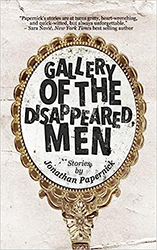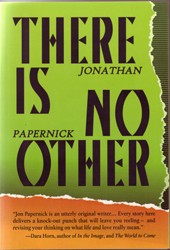In a Brooklyn warehouse, part gun range and part synagogue, trouble is brewing.
Who is susceptible to the morbid attractions of terrorism? Our popular media have made clichés out of half a dozen answers. Jonathan Papernick has created a terrifying novel that illuminates the dark corners of those souls who will give their lives for a cause without regard for their own suffering or that of others.
Though this beautifully written book teems with fully realized supporting characters, most of the insights derive from the portrait of the central character — Matthew Stone. This portrait is so magnificently painted, Matthew is so brilliantly and precisely individualized, that the stock responses to the important question are overwhelmed and transformed. No more glib talk. Real life.
We meet Matthew, a twenty-five-year-old loser with no job, no accomplishments, and no self-worth, as he shakily responds to his father’s death. Judge Walter Stone is a version of “the great man.” A giant in his profession, disgraced by his own drives, he had given Matthew the toughest kind of love — absence and denigration. Yet he remained a giant among militant Zionists.
The judge’s father, also a Zionist hero and a similar kind of disapproving parent,was a feared gangster.
Through his father’s horde of books, books annotated with what seem like clues for Matthew’s destined role in life, and through the approaches of Jewish terrorist leaders planning a major offensive, Matthew finds his cause. Or is he carefully manipulated into it? Or is it his genetic patrimony?
Those handling his indoctrination understand his needs and play upon his fears and insecurities.
Matthew is characterized in part by his many self-inflicted cigarette burns. They are at once self-punishment for his unworthiness, pains that mask other pains, and pains that awaken him from the foggy depression in which he spends his life and allow him to focus.
Finding, committing to, and providing effective action in the service of his defining cause (countering Palestinian legitimacy and murdering Palestinian leaders and partisans) becomes his way of escaping from negative self-judgment, joining an elite community, and valuing, loving, and finally honoring his father through redeeming action. But it is all a grotesque sickness.
Most important to the success of the novel are Papernick’s depictions of Matthew’s key relationships. The first among these is with his mother, who has been manipulated by an FBI agent to return to the son she had abandoned many years ago “for his own good.” Next is Matthew’s tenuous love affair with a young woman who has equivalent emotional scars. Finally, his relationship with his father’s former colleague, a rabbi who needs Matthew to transfer funds sequestered for Zionist terror operations.
Just wait until you discover what goes on inside that Brooklyn warehouse and how the Days of Awe and Jewish rituals figure in this astounding exploration of morality and madness.
Related Content:
Philip K. Jason is professor emeritus of English at the United States Naval Academy. A former editor of Poet Lore, he is the author or editor of twenty books, including Acts and Shadows: The Vietnam War in American Literary Culture and Don’t Wave Goodbye: The Children’s Flight from Nazi Persecution to American Freedom.





